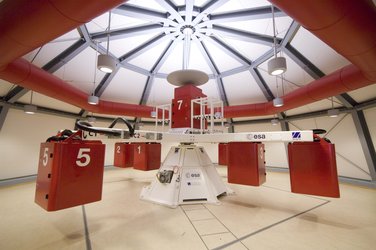Spin Your Thesis! 2010 campaign completed
ESA’s first ‘Spin Your Thesis!’ campaign came to a successful conclusion during the week of 13-17 September, when the third and fourth teams of university students completed their hypergravity experiments.
‘Spin Your Thesis!’ is a new, hands-on educational initiative, organised by ESA’s Education Office and supported by LPS (Life and Physical Sciences) engineers and members of the European Low Gravity Research Association (ELGRA). It enables university students to conduct experiments in hypergravity by using the Large Diameter Centrifuge (LDC) facility at ESA’s European Space Research and Technology Centre (ESTEC) in Noordwijk, The Netherlands.
The 2010 ‘Spin Your Thesis!’ campaign was divided into two sessions, based on the availability of students and ESTEC facilities. The first session was completed by students from Switzerland, Germany and Italy, 14-18 June. The second session of the campaign involved two more teams, made up of students from the UK, Greece and Italy.

The LINV-UNIFI team from the University of Florence developed an experiment to investigate how periods of hypergravity (up to 5 times normal Earth gravity) might directly influence the growth and metabolism of plant cells and organs. The aim of their project was to study the effect of a period of acclimation to higher gravity on the physiological response of root apices, in order to confirm and understand the role of hypergravity as a source of stress for plants.
Soon after their arrival, the students placed their two experiment racks into two gondolas, including multi-electrode array (MEA) systems that would measure changes in the electrical field potentials inside the plant roots. On the Monday afternoon, the students performed some trials with the LDC (without any roots inside) to check the system, followed by a preliminary experiment at 5g with non-acclimated roots.
During the next two days, the maize roots were first acclimated to two different levels of gravity (2g and 5g, respectively) for four hours, after which MEA measurements were performed on these acclimated roots. It is hoped that the results will confirm the role of hypergravity as a source of stress for plants, by detecting different electrical responses of the acclimated and non-acclimated maize roots at different g levels.

The second group, Team Impact, comprised four students from the University of Glasgow in Scotland. Their experiment was designed to reproduce, investigate and define the physical conditions of large, low velocity impacts on highly porous asteroids and other small bodies.
The student activities began by making and curing samples of the asteroid analogue target material into which projectiles would be fired at various impact sizes, velocity and gravity levels. Over the next three days, the samples of material were oven dried in batches of five, with the impact cratering studies taking place in the LDC on Thursday and Friday, at gravity levels of 5, 10, 15 and 20g.
It is hoped that the data collected from this experiment will provide impact and crater response data that will validation and improve current numerical models and scaling theory. This could be applied to the design requirements for any future asteroid impactors, sample return activity and/or impact mitigation studies.

Both teams are now in the process of analysing the results back at their labs, as part of their university studies. The students found their experiences in the LDC facilities of great value. They also expressed their appreciation of the support and expertise provided by the LDC engineers and the ELGRA experts.
A call for proposals for the 2011 ‘Spin Your Thesis!’ campaign was issued by ESA on 6 September. Teams from ESA Member States and Cooperating States are invited to send their proposals by 10 December 2010.















 Germany
Germany
 Austria
Austria
 Belgium
Belgium
 Denmark
Denmark
 Spain
Spain
 Estonia
Estonia
 Finland
Finland
 France
France
 Greece
Greece
 Hungary
Hungary
 Ireland
Ireland
 Italy
Italy
 Luxembourg
Luxembourg
 Norway
Norway
 The Netherlands
The Netherlands
 Poland
Poland
 Portugal
Portugal
 Czechia
Czechia
 Romania
Romania
 United Kingdom
United Kingdom
 Slovenia
Slovenia
 Sweden
Sweden
 Switzerland
Switzerland
































